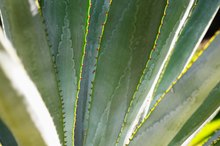What Are the Side Effects of Eating Nopales?
Nopal, also known as the prickly pear, is eaten as food and also used for its supposed medicinal benefits. It is commonly used as a laxative, anti-inflammatory, hangover cure and a natural treatment for diabetes. It is less frequently used for conditions such as acne, colitis and hypertension. There is some evidence that it reduces the symptoms of hangovers and reduces blood sugar, but more research is needed. It is considered generally safe but may produce some undesired side effects whether it is used as food or as medicine.
Allergic Reaction
The AARP -- formerly American Association of Retired Persons -- drug database warns that anyone with an allergy or sensitivity to nopal should not eat nopales nor use any extracts of the plant. Doing so can cause nasal inflammation or asthma. Although many allergic reactions fall into the realm of annoyances, any allergy can be potentially life threatening.
Blood Sugar
Does Cinnamon Increase or Decrease the Appetite?
Learn More
In an article published in "Toxicology and Applied Pharmacology", researchers studied the side effects of a number of Mexican herbal medicines, including nopal. They noted that after eating broiled nopal stems, subjects experienced a significant drop in blood sugar. Subjects eating crude raw nopal extracts didn't experience the same blood sugar change, leading researchers to conclude the heating of the nopales triggered the hypoglycemic effect.
Drug Interactions
Drugs.com mentions that nopales should not be taken with drugs used to regulate blood sugar in patients with diabetes, including the medications glyburide and metformin. When nopal is used with these drugs, blood sugar can drop excessively. Drugs.com warns that nopal, which has diuretic properties, should not be used with pharmaceutical diuretics such as furosemide and hydrochlorothiazide since it could increase diuresis to dangerous levels. AARP notes nopal forms a sticky gel when mixed with water, and this gel can interfere with the body's ability to absorb any medication taken within two hours after eating nopales.
- Drugs.com mentions that nopales should not be taken with drugs used to regulate blood sugar in patients with diabetes, including the medications glyburide and metformin.
- Drugs.com warns that nopal, which has diuretic properties, should not be used with pharmaceutical diuretics such as furosemide and hydrochlorothiazide since it could increase diuresis to dangerous levels.
Other Side Effects
Side Effects of Mulberry Zuccarin
Learn More
AARP reports that the most common side effects are nausea, diarrhea, headaches, and increased stool volume and frequency. Nopal may also suppress the immune system or increase liver toxicity, particularly at large doses. The cactus is likely to be safe when used as food, but medicinal extracts may expose users to unusually large amounts of the active ingredients.
Pregnancy and Breastfeeding
The effect of nopal on pregnancy and lactation has not been studied in a clinical setting. It is unknown what effect nopal could have on developing fetuses or young children. AARP and Drugs.com recommend that, until evidence of the plant's safety has been produced, pregnant or breastfeeding woman avoid eating nopal or taking nopal-based supplements.
Related Articles
References
- AARP: Nopal
- Toxicology and Applied Pharmacology: Risks and Benefits of Commonly used Herbal Medicines in México
- Drugs.com: Prickly Pear
- López-romero P, Pichardo-ontiveros E, Avila-nava A, et al. The effect of nopal (Opuntia ficus indica) on postprandial blood glucose, incretins, and antioxidant activity in Mexican patients with type 2 diabetes after consumption of two different composition breakfasts. J Acad Nutr Diet. 2014;114(11):1811-8. doi:10.1016/j.jand.2014.06.352
- Ota A, Ulrih NP. An Overview of Herbal Products and Secondary Metabolites Used for Management of Type Two Diabetes. Front Pharmacol. 2017;8:436. doi:10.3389/fphar.2017.00436
- Wiese J, Mcpherson S, Odden MC, Shlipak MG. Effect of Opuntia ficus indica on symptoms of the alcohol hangover. Arch Intern Med. 2004;164(12):1334-40. doi:10.1001/archinte.164.12.1334
- Tesoriere L, Butera D, Pintaudi AM, Allegra M, Livrea MA. Supplementation with cactus pear (Opuntia ficus-indica) fruit decreases oxidative stress in healthy humans: a comparative study with vitamin C. Am J Clin Nutr. 2004;80(2):391-5. doi:10.1093/ajcn/80.2.391
- Feingold KR, Anawalt B, Boyce A, et al., editors. Endotext. South Dartmouth, MA: MDText.com, Inc.; 2000.
Writer Bio
Andy Humphrey has been a professional writer for more than 10 years, covering projects from online articles to technical papers and software manuals. His broad background includes extensive knowledge of computer hardware and software, and experience raising a child with multiple disabilities. He holds a Bachelor of Science in chemical engineering.









